The views expressed in our content reflect individual perspectives and do not represent the authoritative views of the Baha'i Faith.
We knew Cecil Rosenthal as the “Honorary Mayor of Squirrel Hill” here in Pittsburgh. Cecil and I worked out at the same fitness gym, but now he is gone, murdered—no, massacred.
Cecil had a big, outgoing personality, one of those people who could liven up any room. He always joked with those around him in a rich, gruff, booming and boisterous voice. When I first met him, he struck me as a good-hearted, happy man. I was so used to hearing Cecil’s resounding voice, which could be heard across the gym, that today’s session seemed empty, like something was missing. Cecil was missing.
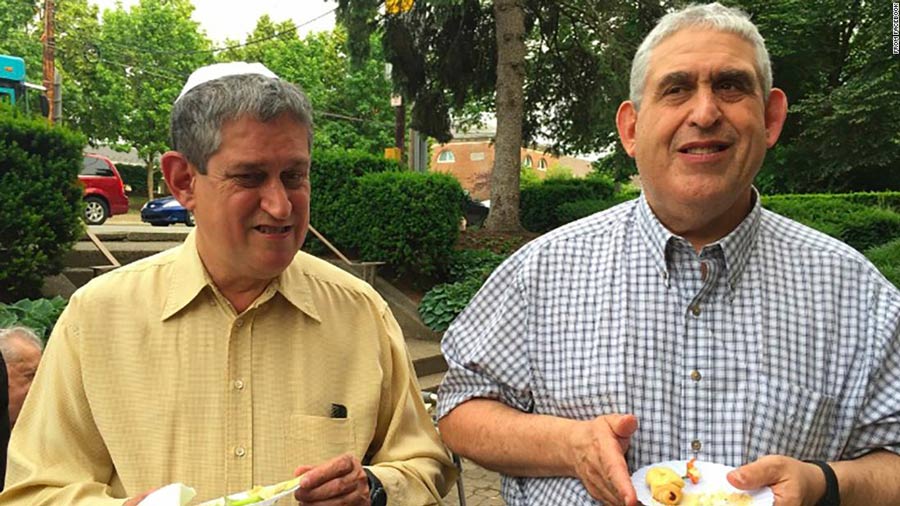
Cecil (right) and his brother David Rosenthal who were both victims of the Tree of Life Synagogue shooting.
When I arrived at the gym’s check-in station, eleven white candles were arranged in a circle. Ten smaller candles flanked a large, lighted candle in the middle, with a “prayer angel” placed in front of the large candle. Of course, those candles were in memory of the eleven victims of the Tree of Life synagogue massacre, Cecil included.
I live in Squirrel Hill, the predominantly Jewish section of Pittsburgh where the recent mass shooting took place at the Tree of Life synagogue, and I’m still in a state of shock over this horrible massacre. My heart goes out, in compassion, to the innocent victims and their bereaved families, and to the world’s entire Jewish community.
So many of my friends and neighbors, as you would expect, are Jewish. Everyone here is wondering: How could such a hate crime happen in “Mister Rogers’ Neighborhood”? (He lived in Squirrel Hill, too.)
My dear wife, Nahzy, and I chose to live in Squirrel Hill because of its proximity to Carnegie Mellon University and the University of Pittsburgh, where our two sons, Taraz and Takur, respectively attended as students. Nahzy and I, as representatives of the Baha’i community of Pittsburgh on Carnegie Mellon University’s Council of Religious Advisors, enjoy working with a couple of the leaders of Pittsburgh’s Jewish community. We also chose Squirrel Hill because it had the reputation of being one of the safest neighborhoods here in Pittsburgh.
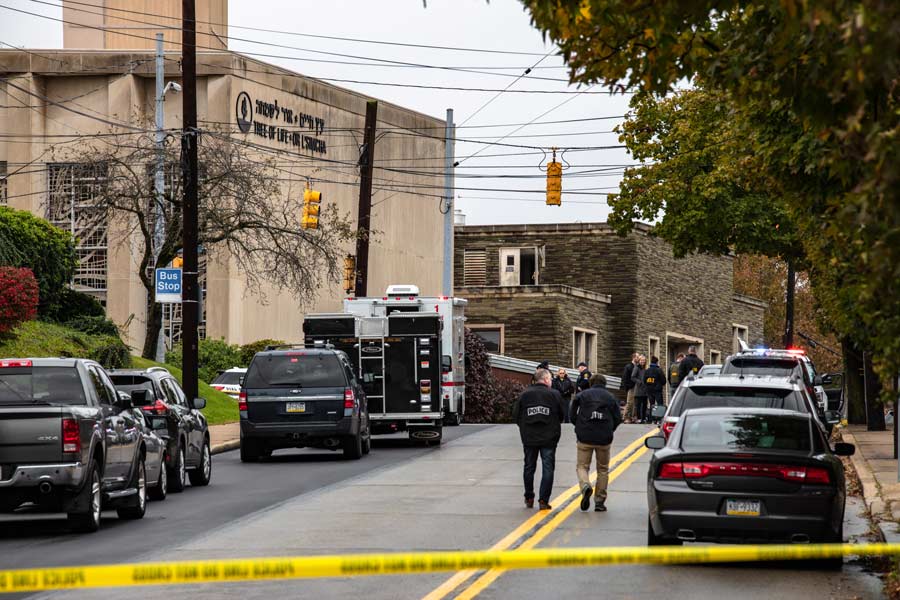
Police and FBI gather outside of Tree of Life synagogue in Pittsburgh, the scene of Saturday morning’s mass shooting.
But I guess no matter where you live, it’s not safe wherever hatred thrives.
So after this terrible massacre of innocent people worshiping in their synagogue, the question becomes: What can we all do to cure the disease of anti-Semitism—and, in a larger sense, the pandemic of racism that afflicts so many people?
You might wonder: What does anti-Semitism have to do with racism? Actually, the word racism got its start, not in the arena of black-white relations, as you may expect, but in 1902 to describe the genocidal American response to its indigenous people, the Indians. But the word racism did not come into wide general use until the rise of the National Socialists—the Nazis—in 1930’s Germany. Nazis believed in a “master race”—the “Herrenvolk,” or “pure” Aryans—and viewed all people with darker skin as subhuman. Their racism placed the Jewish people at the bottom of that category, and justified their slaughter.
So yes, racism includes anti-Semitism.
In addressing this issue of vital importance to our society and to humanity at large, I want to avoid empty platitudes, as well as sterile statements and unrealistic claims. If I may say so, it seems quite impossible to eradicate anti-Semitism when it has reached an advanced stage, like cancer, among those individuals filled with hatred against Jews—or any other group of people.
Some have recommended that such hate-filled, anti-Semitic individuals would first have to be identified (the shooter at the Tree of Life synagogue was unknown to police) and then required to undergo extensive mental health treatment—but suffice it to say that this is not a legal or practical solution.
Instead of addressing the symptoms, then, we need to take action to address the root causes of anti-Semitism—the ugly realities of prejudice and racism in any form:
… among the teachings of Baha’u’llah is that religious, racial, political, economic and patriotic prejudices destroy the edifice of humanity. As long as these prejudices prevail, the world of humanity will not have rest. … all prejudices are destructive of the human edifice. As long as these prejudices persist, the struggle for existence must remain dominant, and bloodthirstiness and rapacity continue. Therefore, even as was the case in the past, the world of humanity cannot be saved from the darkness of nature and cannot attain illumination except through the abandonment of prejudices and the acquisition of the morals of the Kingdom. – Abdu’l-Baha, Selections from the Writings of Abdu’l-Baha, p. 298.
For those readers familiar with some of the Baha’i teachings, you know that the purpose of Baha’u’llah, the prophet and founder of the Baha’i Faith, is to unify the world. To do this, allprejudices—including the hatred and violence that they generate—must be eradicated. To a limited extent, this can be done by various laws that punish the perpetrators of hate crimes—but such laws likely have little deterrent effect. They are after-the-fact measures, and are not aimed primarily at preventing, but rather prosecuting such hate crimes.
Getting at the root causes of racism requires us to renew our culture spiritually—which means the children and youth need to be our primary focus. I’m sure that most of you have tried to change or otherwise influence an adult friend or acquaintance (or even a close relative) and know how very difficult it is to change a person after they have fully formed their outlook on life. So the only realistic way to prevent or at least reduce racism and anti-Semitism in the next generation is to instill in our children and youth a genuine love and respect for the world of humanity as a universal outlook, with care and concern for those individuals whom we encounter in our daily lives.
This will not happen without taking concrete action. No panacea or magic bullet will eliminate anti-Semitism without practical application. Baha’is all over the world are building communities in their neighborhoods, largely through forming free, neighborhood children’s classes and youth groups, in which these universal values are taught, along with practical advice and training in developing positive social skills.
So if you have children or youth in your family or neighborhood, think about contacting your local Baha’is, in order to request information on children’s classes and youth groups. This may be the best practical advice I can offer, because no platitudes, however noble in intent, can solve this seemingly intractable problem. Nothing will bring Cecil and his friends back. Only a complete spiritual springtime in the garden of the human heart can generate the love we need to overcome hatred.
You May Also Like
Comments



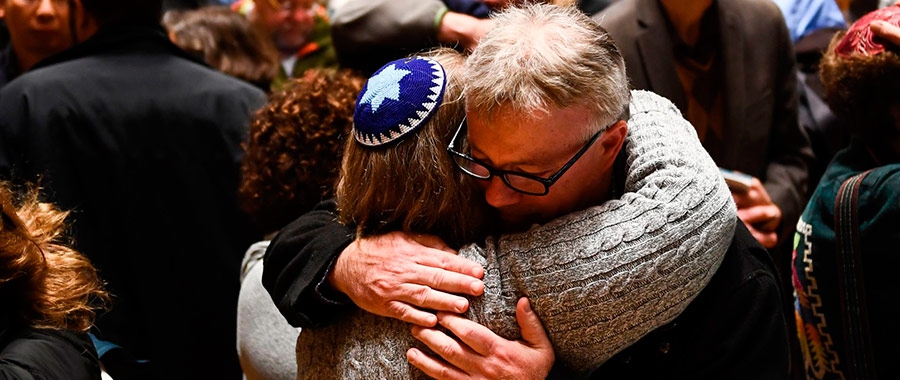

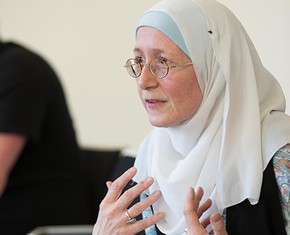
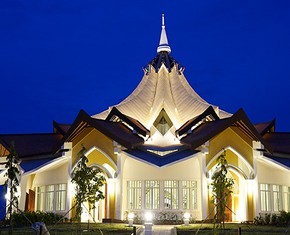










From the Baha'is of the United States to the Baha'is of Pittsburgh (Part 2 of 2)
. . . Please be assured of the prayers of the National Assembly on behalf of those who lost their lives and for all the citizens of your city, that the light of love and friendship may illumine the current darkness, and that all remnants of hatred and enmity may be replaced with abiding unity and peace.
With tender Bahá’í love,
Kenneth E. Bowers
Secretary
National Spiritual Assembly of the Bahá’ís of the United ...States
Posted on the "Bahá’ís of Pittsburgh" website:
www [dot] pittsburghbahai [dot] org
From the Baha'is of the United States to the Baha'is of Pittsburgh:
. . . Please be assured of the prayers of the National Assembly on behalf of those who lost their lives and for all the citizens of your city, that the light of love and friendship may illumine the current darkness, and that all remnants of hatred and enmity may be replaced with abiding unity and peace.
With tender Bahá’í love,
Kenneth E. Bowers
Secretary
National Spiritual Assembly of the Bahá’ís of the United States
...
http://www.pittsburghbahai.org/we-share-with-you-our-deepest-sorrow/?fbclid=IwAR2ZPKMdKxb0eEb35j-1Ku13zOxQvnUIcdOimBJuMjcVibXfwZnua2j8404
October 31, 2018
Spiritual Assembly of the Bahá’ís of Pittsburgh, Pennsylvania
Dear Bahá’í Friends,
We share with you our deepest sorrow in the wake of the tragedy that took place at the Tree of Life Synagogue in your city on October 27, senselessly taking the lives of 11 people in a place of worship. We acknowledge with warm appreciation the letter you addressed to our Jewish brothers and sisters of that synagogue, shared on your website, expressing condolences on behalf of the Bahá’í community. For your information, the National Spiritual Assembly has written letters of ...condolence and solidarity to three national Jewish organizations; a copy of one of these letters is attached for your information. . . .